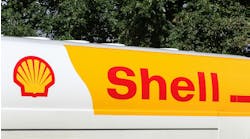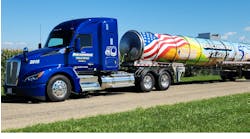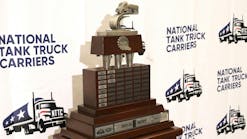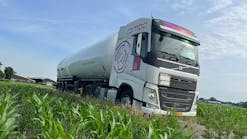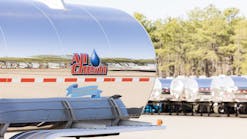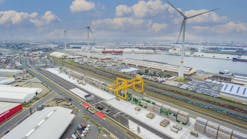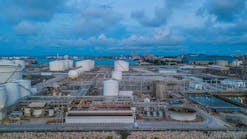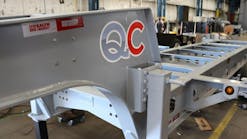In February 2004, Michael Devine, president of Devine Brothers Inc in Norwalk, Connecticut, attended a National Biodiesel Board meeting to learn more about the fuel. He liked what he heard.
“I felt in my core that adding biodiesel to our services was the thing to do,” he recalls. “I almost felt compelled to do it.”
Devine appreciates biodiesel for many reasons, but at the top of the list are its domestic production and environmentally friendly aspects. At the same time, the residential and commercial fuel oil supplier had extra bulk tank storage available that could be dedicated to biodiesel. Across the street from the corporate offices are six storage tanks with 25,000-gallon capacity each for blended fuel and one 50,000-gallon storage tank for pure biodiesel.
“I wasn't sure how our customers would react, and I didn't know how well it would burn,” he says. “It was a leap of faith.”
The company made the announcement that it would supply a biodiesel/fuel oil blend for customers who wished to receive it. The winter of 2004-2005 ended with about 50 accounts signed on. After the end of the next year, all of the almost 500 accounts were ordering the blend of B-5 (5% biodiesel and 95%) fuel oil.
“We found a premium heating oil that is better for the environment,” Devine says. “Biodiesel is no longer just a feel-good boutique fuel for the few. I think there is a clear domestic agenda for most Americans that says that we need to become less dependent on foreign oil imports and we need to stop global warming now. Biodiesel helps meet these goals.”
With its commitment fully underway, the heating oil division was renamed Devine Bioheat to reflect its service. The division was added to Connecticut Senator Joe Lieberman's “Joe's Heroes” list for its use of an alternative home heating oil blend that combines conventional fuel oil with biodiesel.
In presenting the award, Lieberman pointed out that Devine Bioheat sells the blend for a price that is either equal to, or slightly less, than conventional fuel oil. The company can do that by passing on 100% of the saving to its customers for the amount it receives from the federal blender's tax credit.
Devine Bioheat is applying to Connecticut authorities for a grant to share the expense of modifying its terminal so it can blend biodiesel at the rack. Biodiesel, stored in the large tank, is pumped into the smaller bulk tanks containing fuel oil where it is splash-blended. Devine Bioheat hauls biodiesel from nearby rail transloading facilities and tries to maintain a just-in-time supply to keep inventory under control.
Devine admits that the first year was challenging because of the logistics involved when not all the customers were receiving the blend. Trucks were dedicated to each of the two fuels. “We basically became two companies, from a transportation aspect,” he says.
Today, things have settled into a routine — if that can be the definition of a New England operation during a severe winter. Devine Bioheat has 25 drivers and six tankwagons serving its distribution area that covers Fairfield County. Driver routes are made up of about 80% residential accounts and 20% commercial.
Vehicle fleet
Devine says the fleet includes Freightliner, International, and Kenworth trucks with 2,800- to 4,200-gallon tanks built by Allied Tank Company. Newest trucks are equipped with Cummins 250-horsepower engines and Allison automatic transmissions. Typical components include Mid-Com registers, Neptune meters, and Hannay reels. The company specifies Blackmer pumps.
“We like to review what is available with various vehicles,” says Devine. “We are looking for durability and parts availability. Pumps are a concern. We prefer those that don't pump product so fast that we are likely to have a spill at a customer's tank.”
He adds that in Connecticut trucks with larger tanks aren't always better, taking into consideration the dense population, rolling hillsides, and short driveway turns that demand maneuverability.
Despite the delivery conditions, Devine Bioheat has excellent driver retention, Devine says. He attributes part of the driver satisfaction to a schedule that typically begins at 6 am and ends at 3 pm Monday through Friday, allowing the employees to be home each night. If weather conditions worsen, deliveries can be made on Saturdays.
Drivers are cross-trained to handle the company's tankwagons as well as other vehicles in the fleet such as concrete trucks and tri-axle trucks used for material deliveries. Training includes company policies, Department of Transportation regulations, defensive driving, and hazardous materials handling.
The company uses CNC Inc degree-day software to manage delivery schedules. “We have few call deliveries,” says Devine. “The majority are routine schedules.”
All of this began in 1918 by Devine's great-grandfather, Maurice, and his four brothers, all of whom were dairy farmers. Milk transportation naturally sprang from the farming business and soon led to deliveries of feed, masonry, building supplies, and coal.
In 1937 with the emergence of fuel oil, the Devine Brothers increased bulk storage capacity to 600,000 gallons. Fuel oil was shipped to New York and then on to Norwalk via the Norwalk River. The Devine company at that time was able to receive the product at its wharfs, but later the river was no longer navigable. Today, the river is once again handling barges and will soon provide the route for fuel oil and biodiesel transportation directly to the Devine wharf.
But all of that did not happen overnight. In 1936, Devine Brothers moved their operation to Norwalk and began operating a cement plant and other construction-related services. This flagship company has doubled in size since that time. Materials used at the plant also are barged to the Devine wharf, as well as transported by dry bulk trailers. The company has expanded its building supply lines to include landscape supplies and decorative stone.
Michael Devine took over the leadership of the company in 2002 from his father, Maurice, and uncle, Roger. The three-generation company now operates with family management that includes: Richard Devine, treasurer; Sonja Donavan, bookkeeper; Steve Devine, ready-mix sales director; Tom Devine, general manager, fuel oil; and Sean Devine, concrete plant manager.
Consumer demand
As for the future, Devine says he believes consumers will demand biofuels. “The future is difficult to predict now,” he adds. “The issue is really related to terminals: Are they willing to handle the fuel? I think we are on a precipice for how we will use energy. I expect we will see more renewables in the market and changes in our lifestyles, such as less use of hot water in the home and more online shopping to avoid driving.”
He points out that domestically produced renewable fuels can help offset the weak dollar. He also noted that less than 25% of distillate is provided by the United States.
At the same time, he points out the good news that is occurring today. Tests have shown that the use of bioheat in a standard home oil burner results in a substantial reduction of unburned hydrocarbons, carbon monoxide, and particulate matter compared to emissions from petroleum-based distillate fuels.
Another answer to the energy dilemma could be found in state-of-the-art liquefaction facilities to take advantage of the nation's abundant coal supply, Devine says. However, he points out that Congress will have to act on legislation that would boost development.
As the price of fuel continues to escalate and consumers search for alternatives, Devine Bioheat is well-placed to meet the demand. When Michael Devine attended that National Biodiesel Board conference more than four years ago, his decision proved fortuitous for both today and for the future.
